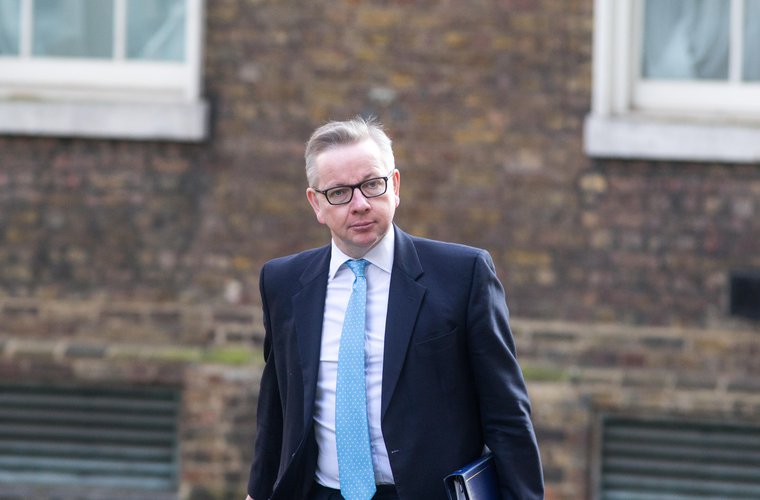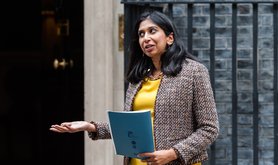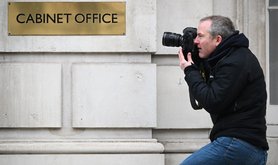
Labour demands investigation into Michael Gove over ‘Orwellian’ FOI unit
Angela Rayner has written to Boris Johnson calling for an inquiry in wake of openDemocracy’s legal victory over secretive ‘Clearing House’


Labour has written to Prime Minister Boris Johnson demanding an investigation into whether Michael Gove broke the ministerial code over a controversial unit accused of ‘blacklisting’ Freedom of Information (FOI) requests from journalists.
Shadow Cabinet Office minister Angela Rayner has called for the independent standards adviser to examine whether Gove misled Parliament in comments he previously made about the Cabinet Office’s secretive Clearing House unit, which advises Whitehall departments on how to respond to FOI requests.
The letter comes after the British government lost its bid to avoid disclosing documents about the Clearing House operation to openDemocracy.
Ruling in openDemocracy’s favour, tribunal judge Chris Hughes said there was a “profound lack of transparency” about the secretive FOI unit.
Hughes also said there was a “lacuna in public information” about how the Cabinet Office ensured transparency and that the tribunal had been misled by Gove’s department.
Rayner’s letter, sent to Johnson and cabinet secretary Simon Case, says the tribunal judgement shows Gove made a statement that “has proven to be untrue” when he appeared before the Public Administration and Constitutional Affairs Committee (PACAC) in December.
Asked about the Clearing House in December, Gove told the PACAC that “the idea that there is a secret Clearing House or any sort of blacklist is... not correct.”
“It would appear that Mr Gove has misled Parliament, whether knowingly or unknowingly, in saying ‘the idea that there is a secret clearing house… is … not correct’, a statement that has been proven to be untrue by this court judgement,” Rayner wrote.
Labour has called on Johnson to appoint the government’s independent adviser Lord Geidt to conduct a full investigation.
“The Ministerial Code is clear that: ‘It is of paramount importance that Ministers give accurate and truthful information to Parliament, correcting any inadvertent error at the earliest opportunity. Ministers who knowingly mislead Parliament will be expected to offer their resignation to the Prime Minister,’” Rayner added.
It would appear that Mr Gove has misled Parliament, whether knowingly or unknowingly
Gove’s PACAC evidence came shortly after openDemocracy broke details of how the Clearing House was vetting FOI. The Cabinet Office minister told the committee that FOI requests were “applicant blind” – meaning that who makes the request should not matter – that “all freedom of information requests are treated in exactly the same way.”
But analysis by openDemocracy suggests most FOI requests sent to the Clearing House have come from journalists and researchers. In recent weeks a number of journalists – including at The Times and investigative journalism site Declassified – have reported that their requests were sent to the Clearing House.
On the same day Gove gave evidence, openDemocracy revealed how the Clearing House had blocked disclosures to infected blood campaigner Jason Evans, comparing the handling of his FOI request to the Chilcot Inquiry into the Iraq war.
Data protection experts have also warned that the Clearing House lists – which are circulated daily across Whitehall with details of journalists and other FOI requesters – could be breaking the law.
Gove’s department had taken openDemocracy to court in a bid to block transparency over the Clearing House unit. The case was heard in April but the judgement was only published in recent days.
Gove had previously called openDemocracy’s journalism “ridiculous and tendentious” but his department has now been ordered to release further details about the Clearing House. The additional documents have yet to be released.
Related story
Sayra Tekin, News Media Association’s legal, policy and regulatory affairs director, called on the government to abolish the Clearing House and to include the new Advanced Research and Invention Agency (ARIA) under FOI legislation.
“This is an important victory for the principles of transparency and open government which, through their journalism, local and national news media uphold on behalf of the public.
“The government must now reconsider its approach to FOI and seek to support it rather than thwarting it. Abolishing the ‘FOI clearing house’ and including ARIA within the scope of FOI would be two important steps towards achieving this.”
Separately openDemocracy has written to the chair of the Public Administration and Constitutional Affairs Committee, William Wragg, and the chair of the Department of Culture Media and Sport Select Committee, Julian Knight, calling for an urgent investigation into the operation of FOI across Whitehall, including the Clearing House.
PACAC member and former shadow chancellor John McDonnell told openDemocracy it was time for a “root-and-branch reform to strengthen the Freedom of Information Act”.
“Access to information is essential to a healthy democracy if people wish to hold its government to account,” he added. “It’s clear that there are some in government doing all they can to avoid accountability by frustrating our Freedom of Information laws.”
There are some in government doing all they can to avoid accountability by frustrating our Freedom of Information laws
An openDemocracy report published last year found that FOI responses have fallen to their lowest levels since the act was brought into force a decade and a half ago. The Cabinet Office is the worst performing Whitehall department on key transparency metrics.
Earlier this year a dozen current and former Fleet Street editors as well as more than 100 journalists, researchers and campaigners signed openDemocracy’s open letter calling for “urgent” action over FOI and for an investigation into the Clearing House operation.
After openDemocracy’s legal victory on Tuesday, a former Cabinet Office press officer tweeted that “from the beginning” the Clearing House was “intended as a way to block or minimise the release of information.”
A Cabinet Office spokesperson said this week: “A Clearing House function has existed since 2004 to help ensure there is a consistent approach across government to requests for information which go to a number of different departments or where requests are made for particularly sensitive information.
“We remain committed to transparency and always balance the need to make information available with our legal duty to protect sensitive information.
“In order to be as transparent as possible we have released the vast majority of information that was requested in this case and have already published a considerable amount of information on Clearing House, including a gov.uk page explaining its purpose and remit.”
Read more
Get our weekly email





Comments
We encourage anyone to comment, please consult the oD commenting guidelines if you have any questions.